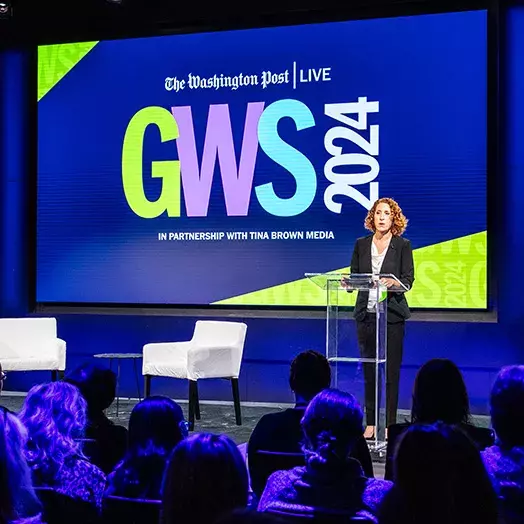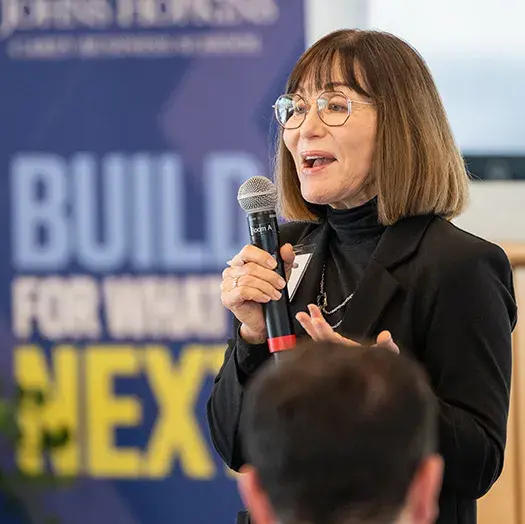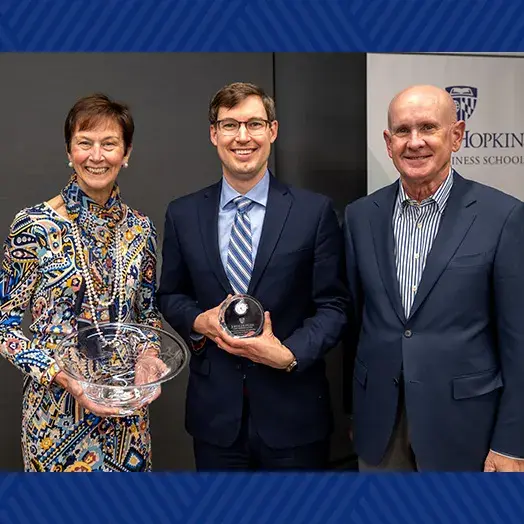Carey’s sponsorship of this event packed with powerhouse panelists highlights the school’s gender parity achievements and commitment to developing female talent.

Carey-sponsored Global Women’s Summit: Celebrating the impact and proving the value of investing in women
A who’s who of powerful and fascinating women gathered for the third annual Global Women’s Summit, presented by the Washington Post in partnership with Tina Brown Media, and with the Johns Hopkins Carey Business School as supporting sponsor.
A theme emerged over a range of topics that included leadership in philanthropy, business, politics, journalism, moviemaking, activism, sports and parenting: women are excelling in all these fields, but often with more barriers than men and with less acclaim when they succeed.
Many of the presenters explained how they are working to enhance opportunities for women.
Asahi Pompey, head of global corporate engagement for Goldman Sachs, spoke of investing in female-owned businesses. Actor, filmmaker and activist Kerry Washington touted the importance of recognizing the Black, female World War II heroes featured in her new movie. Three female governors discussed how they support each other and share ideas. Sisters Chiney and Nneka Ogwumike described how they are building a pipeline of female basketball stars. And whiskey entrepreneur Fawn Weaver explained how she succeeds in a male-dominated industry.
Other presenters included House Speaker Emeritus Nancy Pelosi, AARP Foundation President Claire Casey, political analysts Kellyanne Conway and Meghan McCain, and historian Doris Kearns Goodwin. The setting was intimate, with just 250 seats arranged in semicircles around the stage for a full day of panel discussions and presentations.
Carey’s high-profile sponsorship highlights the school’s gender parity achievements and commitment to developing female talent, said Jill Green, senior associate dean for Student Experience and Strategic Initiatives.
What to Read Next

student experience
Top of the list: Carey is No. 1 in elite category with its fifth-straight year of gender parity in its full-time MBAAdvancing gender equity
Carey is ranked as the world’s top full-time MBA program for gender parity by the Forté Foundation, which supports women in business leadership. For five consecutive years, the program has enrolled more women than men, with a fall 2024 cohort that is 59.6% female.
Building on that milestone, Carey is launching the Gender and Work Initiative to identify barriers to female success and propose solutions.
“I feel strongly that we need research on this topic,” said Jenny Morgan (MS ’86), the Institute’s founding benefactor. Morgan, a Carey graduate and member of the Dean’s Advisory Council, said she wants to remove some of the barriers that she faced while building and leading several Baltimore-based health care technology companies.
“People leave the workforce to raise a family,” she said. “I don’t think it has to be that way, but employers really have to want these women to stay. Environments can be set up to accomplish this, but it requires some different ways of thinking.”
Carey Associate Professors David Smith and Colleen Stuart, co-directors of the new institute, said they plan to partner with businesses and research centers to better understand how to advance gender equity in workplaces. Stuart said this research is important because many well-intentioned interventions, such as mandatory unconscious bias training, aren’t having the desired effects.
These challenges and opportunities were highlighted at the Global Women’s Summit in a segment called The Trillion Dollar Blind Spot: Turning Gaps into Growth for Women Entrepreneurs.
During the segment Pompey, of Goldman Sachs, who leads a community investment agenda that supports small businesses, said women “are starting businesses at a faster clip than ever before,” yet only two percent of venture capital goes to women. She said that is an abysmal statistic that is changing “at a glacial pace.” She also pointed out that women often pay back loans at higher rates than men, pay higher interest rates, are asked for more collateral, and are approved for lower credit amounts.
Among her solutions, Pompey said she’d like to see more data showing investment differences by gender, and more women involved in investment decision-making.
“I'm excited about the opportunity that investors have to invest in phenomenal women[-owned] businesses, because they're out there,” she said.
Investing in women
Investing in female leadership isn’t only about money. Sometimes it takes the form of attention or support.
Washington, in a discussion moderated by Washington Post Senior Critic-at-Large Robin Givhan, spoke about her new movie, “Six Triple Eight,” honoring a previously unsung battalion of the Women’s Army Corps that served during World War II.
“Creating heroes out of everyday Black women was not first and foremost in a lot of people's minds,” she said.
The Sisterhood of Governors panel demonstrated how investment can look like support, as Michelle Lujan Grisham of New Mexico, Laura Kelly of Kansas, and Maura Healey of Massachusetts spoke movingly about sharing ideas for their states and supporting each other as governors and as women.
“What we encounter as women in these jobs and how we're navigating our kids and family and life and aging parents and what have you, how we're navigating professional issues, it's so important to just be able to have that relationship where we can just pick up the phone and talk to one another,” said Healey.
A literal sisterhood was on display when Chiney and Nneka Ogwumike were interviewed by Washington Post Sports Columnist Sally Jenkins about their experiences playing basketball together at Stanford University and then for the Los Angeles Sparks.
“Women can be fierce, women can be feminine, women can be competitive,” said Chiney, now a host and analyst with ESPN.
Added Nneka, WNBA champion with the Seattle Storm and president of the Women’s National Basketball Players Association: “Feminism is not exclusive to women. We are the way we are because there are men that have empowered us to be the way that we can be and that have now allowed us to empower other women and each other.”
Getting to the solution
The final speaker was Fawn Weaver, who shared her remarkable story of starting the billion-dollar Uncle Nearest Premium Whiskey business. The brand, launched in 2017 and now the fastest growing whiskey of all time, is named for Nearest Green, the first known African American master distiller and the first master distiller for Jack Daniel’s Distillery.
Weaver, who details Green’s story and her own in her new book, “Love & Whiskey: The Remarkable True Story of Jack Daniel, His Master Distiller Nearest Green, and the Improbable Rise of Uncle Nearest,” says she’s often asked about the challenges she faces as a woman of color in a male-dominated industry.
“I don't pay attention to challenges,” she said. “I don’t. And the reason I don't is my job is the solution. If I waste my time on the challenge itself, it takes me longer to get to the solution. I expect challenges to be in the way every step of the way, and it's my job to just get to the other side of it.”


